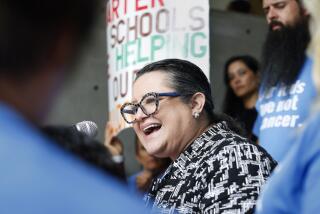Turkish teachers, corporate ties, credit card misuse: Why these 6 L.A. charter schools could get shut down today

When the Los Angeles Board of Education meets Tuesday, it is expected to vote on whether to shut down six charter schools. The main reasons have nothing to do with academics and may not be made public, which outrages charter advocates.
Magnolia Public Schools, which runs three of the campuses, has attracted international attention for its past practice of importing foreign teachers, other school workers and their immediate family members. Magnolia brought in nearly 100 workers, almost all from Turkey.
Celerity Educational Group, which operates two of the schools, is under investigation for possible conflicts of interest among corporations to which it has ties.
And El Camino Real Charter High School has been dogged by allegations that officials misused credit cards and violated open-meeting rules.
The Magnolia and Celerity schools were scheduled for what were to be routine five-year reauthorizations, but now the charter division of the L.A. Unified School District is recommending denials. El Camino, in Woodland Hills, was renewed last year, but that could be moot if the district eventually revokes its authority to operate.
All the schools do pretty well or better academically, which leads those who support charters to assert that the recommendations are unfair. Critics of charters — and those who have issues with the six under review — are applauding L.A. Unified for holding these schools accountable for their entire operations, inside and outside the classroom.
The California Charter School Assn. says that L.A. Unified has approved 155 of 159 charter renewals over the last five years, and that the current recommendations are out of line. Over the weekend it put together a letter to the school board from charter leaders whose schools enroll more than 90,000 students.
L.A. Unified is the U.S. school system with the highest number of independently operated charters, and it oversees them even as it competes with them for students and resources.
“It is distressing and quite simply unacceptable that district staff have taken unexpected and unprecedented steps to close some of our higher-performing academic schools and prevent others from continuing to serve the students who already rely on them,” the letter said.
The head of the district’s administrators union, however, said LAUSD’s long track record of approving renewals suggests such outrage is misplaced.
“I think they’re doing their due diligence, although I also think they are taking closer looks than in the past,” said Juan Flecha, president of Associated Administrators of Los Angeles.
The Magnolia schools have attracted increased attention since the Turkish government accused it and other U.S. charters with mostly Turkish boards of helping to finance a failed coup attempt in Turkey in July. The charters have denied any such ties.
But charter critics across the nation have seized on the controversy. Prominent East Coast education historian Diane Ravitch, who is generally anti-charter, has used her blog to weigh in.
“I hope the Magnolia schools will not be renewed,” Ravitch told The Times on Monday. “It would demonstrate that LAUSD has the backbone to insist upon accountability and transparency.”
When it comes to turning down a renewal petition, the school district must chose a reason sanctioned by state law. Because the threatened schools have met or surpassed academic requirements, the rationale for denying Magnolia and Celerity is that they are “unlikely to successfully implement” their programs and that their petitions do not contain “a reasonably comprehensive description” of areas they are required to cover.
Neither rationale appears to cover concerns about Magnolia’s foreign teachers.
“There probably should be a higher standard for public institutions using the immigration law to hire people for jobs resident workers could fill, but I do not think there is anything in the federal law to that effect,” said David North, a fellow at the Center for Immigration Studies in Washington.
The investigation of Magnolia by the district’s inspector general is both confidential and unfinished.
The same is true for Celerity, though a review of correspondence indicates the district is interested in three corporate entities closely linked with the school group. Officials appear to be concerned about conflicts of interest and whether senior officials inappropriately enriched themselves.
The confidentiality makes it hard for the public to assess the process, and the possible hidden reasons for the recommendations prevent the schools from being able to defend themselves fairly, they say.
The school board is supposed to base its decision only on those findings presented in public, said L.A. Unified General Counsel David Holmquist.
Celerity Dyad in South Los Angeles and Celerity Troika in Eagle Rock, were last renewed in 2011, as were Magnolia Science Academy 1 in Reseda, Magnolia Science Academy 2 in Van Nuys and Magnolia Science Academy 3 in Carson.
The underlying issues at Magnolia and Celerity that concern L.A. Unified are only hinted at officially. The district faults both organizations for not providing requested documents to investigators. Their listed deficiencies will include incomplete descriptions of job duties and of suspension and expulsion procedures.
“These are things that are commonly addressed in the back and forth between the petitioner and the district,” said Nadia Shaiq, Celerity’s director of school services. “This denial recommendation is unexpected. Learning this at the last minute is a shock to our board, our students and our community.”
Caprice Young, Magnolia’s chief executive, said, “It would be wrong to punish kids by closing strong schools.”
El Camino’s defenders make a similar argument, insisting that the school has corrected its problems.
Twitter: @howardblume
More to Read
Start your day right
Sign up for Essential California for news, features and recommendations from the L.A. Times and beyond in your inbox six days a week.
You may occasionally receive promotional content from the Los Angeles Times.







